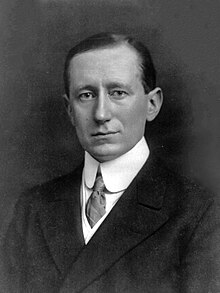This article's lead section may be too short to adequately summarize the key points. (September 2024) |
Guglielmo Marconi | |
|---|---|
 Marconi in 1908 | |
| Member of the Senate of the Kingdom | |
| In office 30 April 1914 – 20 July 1937 | |
| Appointed by | Victor Emmanuel III |
| Personal details | |
| Born | Guglielmo Giovanni Maria Marconi 25 April 1874 Bologna, Kingdom of Italy |
| Died | 20 July 1937 (aged 63) Rome, Kingdom of Italy |
| Political party | PNF (1923–1937) |
| Alma mater | University of Bologna |
| Occupations |
|
| Known for | |
| Spouses |
Beatrice O'Brien
(m. 1905; div. 1924) Maria Cristina Bezzi-Scali
(m. 1927) |
| Children | 5 |
| Awards |
|
| Engineering career | |
| Discipline | Electrical engineering |
| Employer(s) | Marconi's Wireless Telegraph Company |
| Significant advance | Radio |
| Signature | |
Guglielmo Giovanni Maria Marconi, 1st Marquis of Marconi GCVO FRSA (Italian: [ɡuʎˈʎɛlmo marˈkoːni]; 25 April 1874 – 20 July 1937) was an Italian[1][2][3][4] inventor, electrical engineer, physicist and politician known for his creation of a practical radio wave-based wireless telegraph system.[5] This led to Marconi being credited as the inventor of radio,[6] and winning the 1909 Nobel Prize in Physics with Karl Ferdinand Braun "in recognition of their contributions to the development of wireless telegraphy".[7][8][9] His work laid the foundation for the development of radio, television, and all modern wireless communication systems.[10]
Marconi was also an entrepreneur, businessman, and founder of The Wireless Telegraph & Signal Company in the United Kingdom in 1897 (which became the Marconi Company). In 1929, Marconi was ennobled as a Marchese (marquis) by King Victor Emmanuel III of Italy, and, in 1931, he set up Vatican Radio for Pope Pius XI.
- ^ "Guglielmo Marconi | Italian physicist". Encyclopædia Britannica. 21 April 2023.
- ^ "This week in tech". The Daily Telegraph. London. 28 April 2017. Archived from the original on 11 January 2022.
- ^ "Guglielmo Marconi". History. 27 March 2023.
- ^ Gavin Weightman, The Industrial Revolutionaries: The Making of the Modern World 1776–1914, Grove/Atlantic, Inc. 2010. p. 357.
- ^ Bondyopadhyay, Prebir K. (1995). "Guglielmo Marconi – The father of long-distance radio communication – An engineer's tribute". 25th European Microwave Conference, 1995. p. 879. doi:10.1109/EUMA.1995.337090. S2CID 6928472.
- ^ Hong, p. 1
- ^ "Guglielmo Marconi: The Nobel Prize in Physics". nobelprize.org. 1909.
- ^ Bondyopadhyay, P. K. (1998). "Sir J.C. Bose diode detector received Marconi's first transatlantic wireless signal of December 1901 (the 'Italian Navy Coherer' Scandal Revisited)". Proceedings of the IEEE. 86: 259. doi:10.1109/5.658778.
- ^ Roy, Amit (8 December 2008). "Cambridge 'pioneer' honour for Bose". The Telegraph. Kolkota. Archived from the original on 23 January 2009. Retrieved 10 June 2010.
- ^ "Marconi forged today's interconnected world of communication". New Scientist. New Scientist Ltd. Retrieved 28 June 2024.